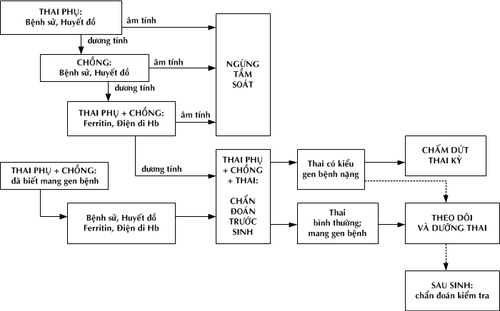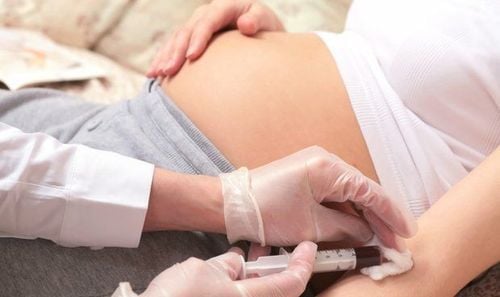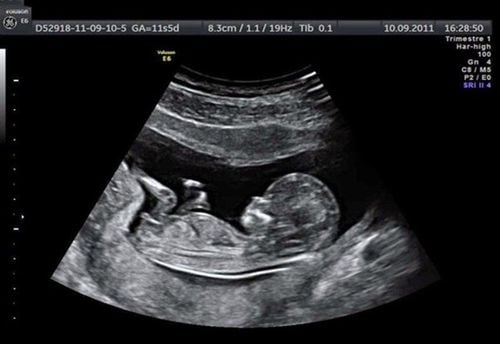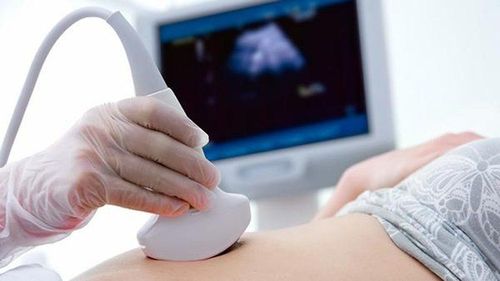This is an automatically translated article.
Article written by Master, Doctor Nguyen Thi Le - Doctor of Obstetrics and Gynecology - Department of Obstetrics and Gynecology - Vinmec Danang International Hospital
Prenatal screening will help mothers better understand the development of the fetus and the risks that the fetus may face. So in the case of abnormal prenatal screening results, what should pregnant women do to ensure the safety of both mother and child?
1. What is prenatal screening?
During pregnancy, the mother is very easily affected by external influences that affect her health, so it is likely that the fetus is also affected by those factors. Moreover, during pregnancy there are mutations that the mother cannot control. To know the development status of the fetus, pregnant women should perform prenatal screening tests as soon as possible to understand the development status of the baby.
Prenatal screening includes:
Family history: history of childbirth with birth defects, Trisomy, father or mother with chromosomal disorders .... Mother's age at pregnancy: maternal age ≥ 35 fetuses at increased risk: Down syndrome, Trisomy 18,13, genetic abnormalities, birth defects, miscarriage... Screening and diagnostic ultrasound: First trimester ultrasound, translucency measurement nape skin, early birth defects detection (cerebrovascular, ectopic pregnancy), nasal bone abnormalities, short maxillary bone, one umbilical artery, enlarged bladder, tachycardia, fetal growth retardation In utero, abnormal doppler ductus venosus... Second trimester ultrasound, morphological investigation, finding signs of chromosomal abnormalities such as: dilated ventricles, cleft palate, cystic vascular plexus, chin small, single ventricle, nasal bone hypoplasia, nuchal edema, diaphragmatic hernia, cardiac malformation, umbilical hernia, duodenal stenosis, esophageal stenosis, short limbs, polydactyly, clubfoot, intrauterine growth retardation bow...
2. Biochemical and hematological tests for screening
Normally, biochemical and hematological tests for screening include the following tests:
Blood test: to assess the health of the pregnant woman and screen for Thalassemia Double test: 11 weeks - 13 weeks 6 days pregnant (PAPP-A + beta-hCG total or free) Triple test : 15 weeks-20 weeks 6 days (uE3 + AFP + beta-hCG total or free ) The NIPT (Non Invasive Prenatal genetic Tesing) test is a test Noninvasive prenatal screening test through sequencing of DNA (genetic material), fetuses from pregnant women's blood to detect chromosomal abnormalities. Taken from the 10th week to the end of pregnancy.
3. When is prenatal screening abnormal?
3.1 Thalassemia Disease Thalassemia is the most common hereditary hemolytic anemia group in Vietnam and in the world, creating a great burden for families and society. The World Health Organization (WHO) identifies thalassemia as a serious health problem and recommends that Southeast Asian countries choose thalassemia as one of their top priorities for human genetics.

Pregnant women who have a blood test done, have abnormal blood smear results with MCV < 80 fL or MCH < 28pg called positive, continue to screen according to the above procedure.
3.2 Chromosomal Abnormalities Early Pregnancy (11 weeks to 13 weeks 6 days) Pregnant women can have a combination of ultrasound and NIPT or Double test. Perform ultrasound for the purpose of checking and measuring the nuchal translucency index along with the baby's nose length,... to evaluate early birth defects and chromosomal abnormalities.
In case of double test, the risk of chromosomal disorders will be assessed through the combined test, after adjusting for risk factors such as maternal age, race, maternal weight, smoking status, pregnancy IVF .... Evaluate high risk if > 1/250, low risk if < 1/1000, threshold risk if within 1/250 to 1/1000
Mid-pregnancy (from week to week) 15th to 22nd week of pregnancy) At this stage, with fetuses at high risk of birth defects after screening in the early stages, doctors will conduct a test of amniotic fluid for pregnant women. To check the amniotic fluid, the doctor uses a syringe to collect 20ml of amniotic fluid of the pregnant mother to analyze and evaluate the sample.
Conversely, if screening for birth defects is low in the early stages of pregnancy, you will not need amniocentesis. At this time, pregnant women only need to perform morphological ultrasound to diagnose malformations through images.
If pregnant women have not had screening tests in the early stages, they can choose NIPT test or Triple test. The risk assessment of the Triple test is similar to that of the double test in that the ratio is >1/250 high risk, low risk if < 1/1000, threshold risk if within the range 1/250 to 1/1000.
Last stage of pregnancy Only need to perform ultrasound assessment of fetal development or ultrasound morphology when necessary to diagnose more carefully and accurately about possible abnormalities in the baby.
4. What to do when antenatal screening is abnormal?
With the results in the high-risk group, screening (double test, triple test or NIPT) will be conducted with an invasive procedure (amniotic fluid test) to do genetic and chromosomal diagnostic tests. .
The results will be consulted by an obstetrician or geneticist on causes, directions for monitoring, treatment, intervention or termination of pregnancy with severe birth defects.
Ideally, when noticing abnormal prenatal screening results, pregnant women should not be too alarmed, but need to see a doctor for advice and solutions to avoid adverse effects on their own health as well as the fetus. pediatric.
In order to improve the ratio of "mother round and square child" as well as limit the burden on family and society. Vinmec International General Hospital currently has a package maternity service as a solution to help pregnant women feel secure because of the companionship of the medical team throughout the pregnancy. When choosing Maternity Package, pregnant women can:
The pregnancy process is monitored by a team of qualified doctors Regular check-up, early detection of abnormalities Maternity package helps to facilitate the process. birthing process Newborns get comprehensive care

Please dial HOTLINE for more information or register for an appointment HERE. Download MyVinmec app to make appointments faster and to manage your bookings easily.














